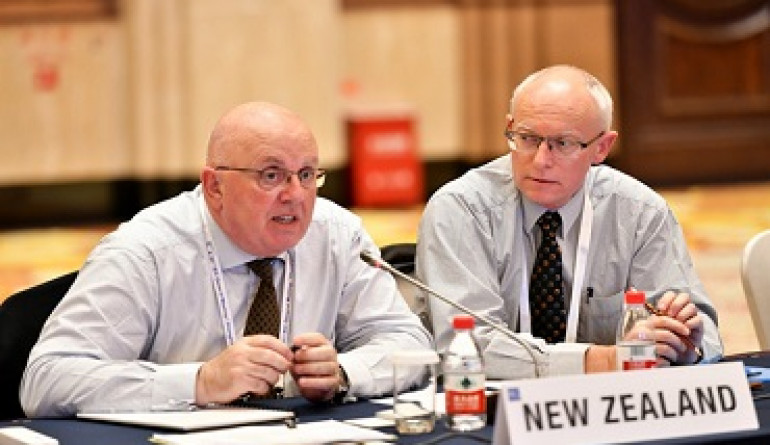Sustainability and gender diversity key themes at IEC General Meeting
Standards NZ’s Senior Advisor International Relationships, Steve Lowes, attended the International Electrotechnical Commission’s (IEC) General Meeting in Shanghai. Steve is also the Secretary of the IEC’s National Committee of NZ (NCNZ), was joined by the NCNZ President, Peter Berry.

Standards New Zealand’s Senior Advisor International Relationships, Steve Lowes, attended the International Electrotechnical Commission’s (IEC) General Meeting in Shanghai late last year. The theme of the event was Better Quality Better Life – Reliability, Safety, Efficiency.
Close to four thousand delegates from 173 countries attended. Aside from Steve, who is also the Secretary of the IEC’s National Committee of NZ (NCNZ), there were 12 other New Zealand attendees. These included the NCNZ President, Peter Berry, and representatives from leading New Zealand companies and organisations, including the NZ Lighting Council, Fisher & Paykel, University of Otago, Datamars/ Tru Test, Gallagher and WSP Opus.
They joined other international industry leaders, technology experts, regulators, academics and other stakeholders to discuss future IEC goals and take stock of IEC standardisation and conformity assessment work.
IEC supports UN Sustainable Development Goals
Sustainability was a major theme of the meeting. The United Nations defines 17 Sustainable Development Goals (SDGs) at the core of its blueprint for building a better world by 2030. The SDGs serve as a universal plan that all countries can use to help end poverty, stimulate economic growth, and preserve the environment. IEC standards and conformity assessment systems contribute to each of these 17 SDGs.
“These SDGs set the global development agenda until 2030,” explains Steve. “There are clear objectives and measurable targets to determine progress for each goal. However, achieving the goals will require global cooperation.”
New Zealand has made a commitment to contribute to achieving these goals through a combination of domestic action, international leadership on global policy issues, and supporting countries through the New Zealand Aid Programme.
Standards perform a key role in helping New Zealand contribute at an international level. “Our link is via the two main international standards bodies, the IEC and the International Organization for Standardization (ISO),” says Steve. “Both the ISO and IEC have completed work which identifies which of their technical and subcommittees (and the standards they develop) contribute to the SDGs.
“New Zealand’s participation in international, national and joint Australian/ New Zealand standards development demonstrates our commitment to meeting specific SDGs.”
Gender diversity adds perspective in standardisation
Another key theme at the IEC General Meeting was gender diversity and the importance of embracing the female perspective in standardisation. The conference discussed how gender equality is essential for achieving peace, defending rights, fostering economic growth, and promoting global wellbeing. In standardisation, it is important to include female insights for everyone’s benefit.
“The United Nations Economic Commission for Europe (UNECE) Gender Responsive Standards Initiative provides a practical way for standards bodies to make the standards they develop and the standards development process they follow gender-responsive,” explains Steve.
“It is for each organisation to decide what they can and should include in their gender action plan. The list of actions is not exhaustive; it is intended to provide ideas and inspiration for gender action plans for all standards development organisations.
“The next step for New Zealand is for Standards NZ and the IEC NCNZ to develop a gender action plan. Standards NZ has established a team that will follow through on implementing the requirements under the UN’s Gender Responsive Standards Initiative,” says Steve.
